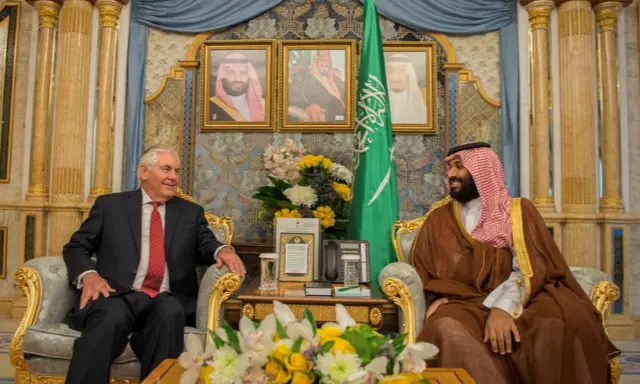U.S. Secretary of State Rex Tillerson left Qatar on Thursday after a tour of Gulf Arab countries aimed at easing the worst regional dispute in years, saying he made proposals that would help in resolving the month-long crisis.
Tillerson met Qatar's emir, Sheikh Tamim bin Hamad al-Thani, to discuss Doha's feud with four Arab states that cut ties with Qatar on June 5 over allegations it funds extremist groups and is allying with their arch-foe Iran. Qatar denies this.
"Well I think it was helpful for me to be here and actually talk to them about a way forward, first to listen and get a sense of how serious the situation is, how emotional some of these issues are," Tillerson told reporters after leaving Doha.
"But we tabled some documents with both sides while we were here which lays out some ways that we might move this forward," he added.
Tillerson had been flying between the two sides and Kuwait, which has been acting as the mediator between the feuding Gulf countries, in the last two days in an effort to ease a crisis that put the whole region on edge.
On Thursday he flew back to Doha where he met Qatari rulers for the second time in two days. He also met with Kuwaiti and Saudi officials.
Tillerson said he was not a direct mediator but supporting the emir of Kuwait's role in building bridges to end the crisis.
"In my view there's a changed sense of willingness to at least be open to talking to one another and that was not the case before I came," he said.
Saudi Arabia, the United Arab Emirates, Egypt and Bahrain accused Qatar of supporting the Muslim Brotherhood, an Islamist movement that has been the greatest challenge to Arab autocrats. The Brotherhood was a major player in the Arab spring revolts across the Middle East and North Africa.
Qatar hosts some of the movement's prominent figures, including the spiritual leader and Egypt-born Yusuf al-Qaradawi.
"As to the Muslim Brotherhood, we've had sticking points with these parties ourselves, the U.S., in terms of how we view the Muslim Brotherhood's activities," Tillerson said. "And there's a difference of view among these parties over the Muslim Brotherhood, and again in many ways it's not much different than the differences we have."
On Wednesday, Tillerson left the Saudi Red Sea city of Jeddah after talks with ministers from Saudi Arabia, Bahrain, the United Arab Emirates and Egypt, the four countries which have imposed travel and commercial sanctions on Qatar.
He earlier signed a U.S.-Qatari accord on terrorism financing in an effort to help ease the crisis, but Qatar's opponents said it fell short of allaying their concerns.
"No wavering on the 13 demands" the headline of the Abu Dhabi government-linked al-Ittihad newspaper read on Thursday, referring to a list of demands the Arab states had put to Qatar.
(REUTERS)
 简体中文
简体中文

